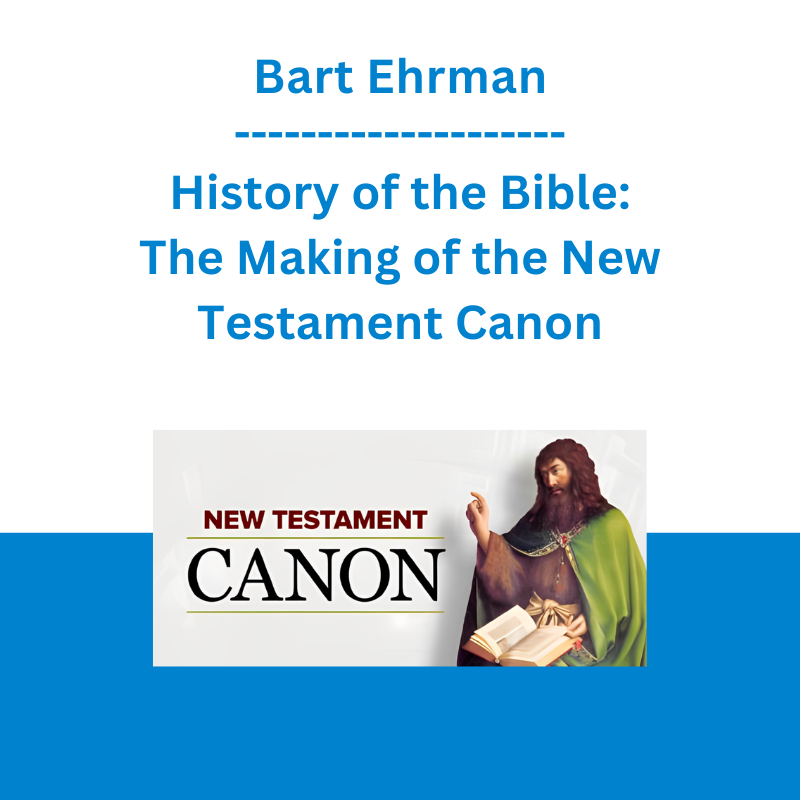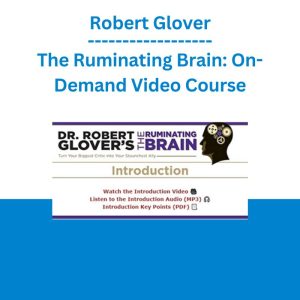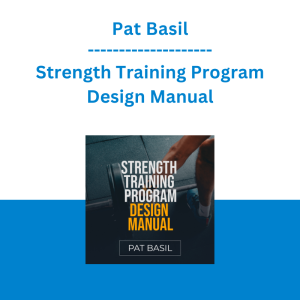*** Proof of Product ***
Exploring the Essential Features of “Bart Ehrman – History of the Bible: The Making of the New Testament Canon”
History of the Bible: The Making of the New Testament Canon
Delve into a thorough introduction to key issues in the development of Christianity in this course designed by an award-winning professor.
LECTURE
01:The New Testament-An Overview
The course begins by addressing some of the basic facts about the New Testament: which books it contains, when they were written, in what language, and by whom….
32 min
02:Paul-Our Earliest Christian Author
The Epistles of Paul are the earliest books of the New Testament, predating even the Gospels. In considering the realities of writing a letter in the ancient world, we discover some interesting issues that affect how we understand Paul’s Epistles and the other writings of the New Testament….
31 min
03:The Pauline Epistles
This lecture looks at some of the major teachings of Paul’s Epistles and shows how he shaped his theological and ethical views in light of the problems that had emerged in his burgeoning Christian communities….
30 min
04:The Problem of Pseudonymity
This lecture considers the broad problem of pseudonymity, or forgery, in the ancient world, and applies our findings to the Pauline letters of the New Testament to see if any, in fact, were written by Paul’s followers rather than Paul himself….
31 min
05:The Beginnings of the Gospel Traditions
This lecture looks at the roots of the Gospel narratives in the oral traditions that were spread throughout the Mediterranean in the years after Jesus’ death, examining how they might have been modified and what we can know about their historical accuracy….
31 min
06:The Earliest Gospels
This lecture examines the Gospels of Matthew, Mark, Luke, and John, considering what sources of information were available to their anonymous authors, their overarching messages, possible discrepancies among these accounts, and whether they can be trusted as reliable historical documents….
30 min
07:The Other Gospels
There were many additional accounts of Jesus’ words, deeds, death, and resurrection that were not included in the New Testament. This lecture discusses the reasons why they were excluded, and examines two of the most important of them in greater detail….
31 min
08:Apocalypticism and the Apocalypse of John
This lecture examines the Apocalypse of John, otherwise known as the Book of Revelation, explaining both the religious view known as apocalypticism and the way the book’s symbolic descriptions would have been understood in the context of the times….
31 min
09:The Copyists Who Gave Us Scripture
Why were the books of the New Testament circulated? What made Christians eager to read them? This lecture explores the rarity of a book-based religion in the Roman world and the significance to early Christianity of the decisions about which books to accept as authoritative….
31 min
10:Authority in the Early Church
The need to have written authorities for faith and practice is ultimately what drove Christians to construct a distinctively Christian canon of Scripture to add to the existing Old Testament. This lecture explores how Christian leaders decided which books to include in this canon….
31 min
11:The Importance of Interpretation
Even as Christians began to agree on which books were to be accepted, they were confronted with the dilemma caused by differing interpretations. This lecture examines the ways early Christians interpreted these texts, with special note on the problems raised by “figurative,” and not simply literal, readings….
30 min
12:When Did the Canon Get Finalized?
The lecture examines how, why, and when the canon of 27 books was finalized, and includes a look at some that almost made it in, such as the Apocalypse of Peter-and some that almost did not, such as the Apocalypse of John….
31 min
DETAILS
Overview
The History of the Bible: The Making of the New Testament Canon offers you a fast-moving yet thorough introduction to key issues in the development of the New Testament. These include: its different kinds of books, the conditions in which they were composed, what they teach, who actually wrote them, and-perhaps most important of all-why and how some books and not others became part of the canon of scripture that would define Christianity for all time. With their scholarly approach, these insightful lectures provide a deeper understanding of the New Testament for both Christians and non-Christians alike.
About
Bart D. Ehrman
After his crucifixion, Jesus’ disciples came to believe he’d been raised from the dead and made a divine being. What had seemed like defeat became for them the ultimate cosmic victory.
Dr. Bart D. Ehrman is the James A. Gray Distinguished Professor at The University of North Carolina at Chapel Hill. He completed his undergraduate work at Wheaton College and earned his M.Div. and Ph.D. from Princeton Theological Seminary. Professor Ehrman has written or edited 27 books, including four best sellers on The New York Times list: Misquoting Jesus: The Story behind Who Changed the Bible and Why; God’s Problem: How the Bible Fails to Answer Our Most Important Question-Why We Suffer; Jesus, Interrupted: Revealing the Hidden Contradictions in the Bible (and Why We Don’t Know about Them);and Forged: Writing in the Name of God-Why the Bible’s Authors Are Not Who We Think They Are. Professor Ehrman also served as president of the Society of Biblical Literature, Southeastern Region; book review editor of the Journal of Biblical Literature; editor of the Scholars’ Press monograph series The New Testament in the Greek Fathers;and coeditor-in-chief for the journal Vigiliae Christianae. Professor Ehrman received the John William Pope Center Spirit of Inquiry Award, the UNC Students’ Undergraduate Teaching Award, the Phillip and Ruth Hettleman Prize for Artistic and Scholarly Achievement by Young Faculty, and the Bowman and Gordon Gray Professorship (awarded for excellence in undergraduate teaching).
REVIEWS
Dr Jayant Malhotra
Atheistic Agenda propagated as so called “Facts”
The problem with this course is that Mr. Erhman is gravely inclined on spoiling the reputation of the Bible and hence makes absurd self-intrested claims that are not at all implied by the bible and presents them as though they were facts. As a historian, this is really disappointing and highly propagandized message from a person who is confused with himself. The accuracy of Erhman’s claims is laughable by the fact that he has so many contradictions in his teachings. Poor Course but kind of expected this from TGC with their anti-christian agenda.
Scott 1der
An older course but still relevant and informative
This is my 3rd Great Courses series on this subject. This is apparently one of the earlier courses…production quality is definitely outdated, but the material hasn’t changed (although they were still using B.C. And A.D.). Professor Ehrman is an engaging and entertaining lecturer.
Jivan
Outstanding coarse. Ehrman is very knowledgeable and makes the topic interesting and worth listening to.
Please see the full list of alternative group-buy courses available here: https://lunacourse.com/shop/










 Matan Feldman - The 13-Week Cash Flow Modeling - Wall Street Prep
Matan Feldman - The 13-Week Cash Flow Modeling - Wall Street Prep  Simpler Trading - Bruce Marshall - The Options Defense Course
Simpler Trading - Bruce Marshall - The Options Defense Course  Tej Dosa - Clean Your Inner World- Reprogram Your Mind In 45 Days
Tej Dosa - Clean Your Inner World- Reprogram Your Mind In 45 Days  George Fontanills & Tom Gentile - Optionetics 6 DVD Series Home Study Course (Digital Download)
George Fontanills & Tom Gentile - Optionetics 6 DVD Series Home Study Course (Digital Download)  The Daily Traders – Exclusive Trading Mentorship Group
The Daily Traders – Exclusive Trading Mentorship Group  Sovereign Man Confidential - Renunciation Video
Sovereign Man Confidential - Renunciation Video  Crypto Dan - The Crypto Investing Blueprint To Financial Freedom By 2025
Crypto Dan - The Crypto Investing Blueprint To Financial Freedom By 2025  Megan Auman - Brand Your Creative Business
Megan Auman - Brand Your Creative Business  Robert Glover - The Ruminating Brain: On-Demand Video Course
Robert Glover - The Ruminating Brain: On-Demand Video Course  Forexmentor - Recurring Forex Patterns
Forexmentor - Recurring Forex Patterns  Fred Haug - Virtual Wholesaling Simplified
Fred Haug - Virtual Wholesaling Simplified  Matthew Kratter - Trader University
Matthew Kratter - Trader University  Emanuele Bonanni - My Trading Way
Emanuele Bonanni - My Trading Way  Toshko Raychev - Profit System + ITF Assistant
Toshko Raychev - Profit System + ITF Assistant  Chris Capre - Advanced Price Action Ongoing Training & Webinars
Chris Capre - Advanced Price Action Ongoing Training & Webinars  Greg Loehr - Advanced Option Trading With Broken Wing Butterflies
Greg Loehr - Advanced Option Trading With Broken Wing Butterflies  Megan Auman - Simple Email Marketing for Makers
Megan Auman - Simple Email Marketing for Makers  Pat Basil - Strength Training Program Design Manual
Pat Basil - Strength Training Program Design Manual  Richard Clear - 4oz Moves 1000lbs & Hua Jin
Richard Clear - 4oz Moves 1000lbs & Hua Jin